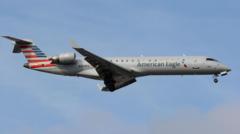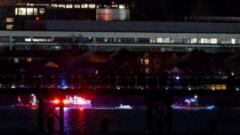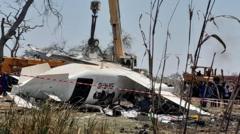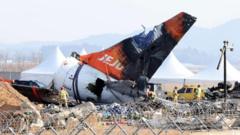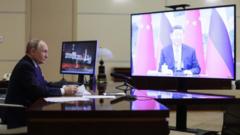Amid growing concerns over aviation safety, South Korea's transportation ministry is ordering its budget airlines to tighten safety measures following a devastating plane crash.
**South Korean Aviation Safety Measures Enforced After Tragic Crash**

**South Korean Aviation Safety Measures Enforced After Tragic Crash**
In response to the Jeju Air disaster, South Korea mandates budget airlines to enhance safety protocols.
South Korea is taking decisive action to reinforce safety protocols among its budget airlines after the tragic crash of a Jeju Air flight last month that claimed 179 lives. During a critical meeting with representatives from the nation's nine low-cost carriers, the government urged them to place safety ahead of profit.
In line with these directives, the transportation ministry has recommended that airlines reduce daily flight hours, improve pilot training and increase maintenance staff. Although no formal safety targets were established, airlines are tasked with independently devising their strategies to enhance safety.
As a proactive measure, Jeju Air has committed to decreasing its average daily flight time from 14 hours to 12.8 hours and has announced plans to hire an additional 41 maintenance workers, bringing its total to 350. This response comes in the wake of the airline's Boeing 737-800 crashing into a concrete wall at Muan International Airport, marking it as South Korea's deadliest aviation incident in over a decade, and the worst globally since the 2018 Lion Air Flight tragedy.
In the aftermath, travel agencies have reported a notable increase in trip cancellations, as public confidence in air travel has wavered. While investigations into the crash are ongoing, involving an examination of the aircraft's maintenance records and possible engine failure due to external factors, the transportation ministry has stressed that airlines that do not prioritize safety will face serious repercussions, including potential suspension of their flight certifications.
Ensuring rigorous safety compliance, the ministry's statement emphasizes that airlines neglecting these measures risk alienating travelers, leading to their potential demise in the competitive market.
In line with these directives, the transportation ministry has recommended that airlines reduce daily flight hours, improve pilot training and increase maintenance staff. Although no formal safety targets were established, airlines are tasked with independently devising their strategies to enhance safety.
As a proactive measure, Jeju Air has committed to decreasing its average daily flight time from 14 hours to 12.8 hours and has announced plans to hire an additional 41 maintenance workers, bringing its total to 350. This response comes in the wake of the airline's Boeing 737-800 crashing into a concrete wall at Muan International Airport, marking it as South Korea's deadliest aviation incident in over a decade, and the worst globally since the 2018 Lion Air Flight tragedy.
In the aftermath, travel agencies have reported a notable increase in trip cancellations, as public confidence in air travel has wavered. While investigations into the crash are ongoing, involving an examination of the aircraft's maintenance records and possible engine failure due to external factors, the transportation ministry has stressed that airlines that do not prioritize safety will face serious repercussions, including potential suspension of their flight certifications.
Ensuring rigorous safety compliance, the ministry's statement emphasizes that airlines neglecting these measures risk alienating travelers, leading to their potential demise in the competitive market.







